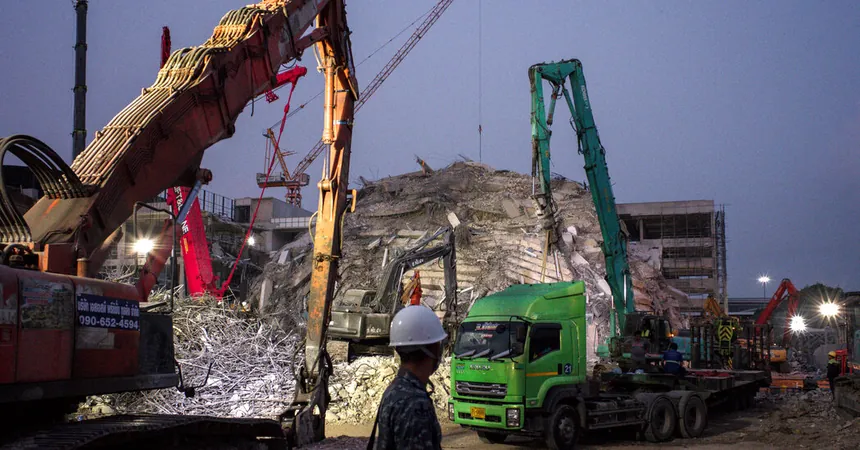
Bangkok Building Collapse: Serious Questions Arise for Chinese Construction Firm
2025-04-02
Author: Yan
The chaotic aftermath of an earthquake in Myanmar last Friday has led to a tragic building collapse in Bangkok, resulting in the tragic loss of at least 15 lives and leaving dozens missing. Recovery operations are still ongoing, but uncovering the true causes behind the disaster may take months.
Emerging reports and testimonies from construction workers reveal alarming issues within the building's design and construction quality, focusing scrutiny on China Railway 10th Engineering Group, a Chinese state-owned enterprise that has multiple ongoing projects across Thailand. Compounding the investigation, it has been reported that some contractors attempted to remove crucial documents from the site in the wake of the tragedy, raising further suspicions.
Behind the scenes, this company operates under the umbrella of China Railway Group, a colossal infrastructure entity facing financial pressures and accusations of reducing safety standards in numerous foreign projects. Workers have disclosed serious allegations that China Railway 10th often underpaid subcontractors, which led to the use of inferior materials and design flaws, including the use of narrower columns than standard safety practices suggest.
Authorities conducting investigations have already identified subpar steel used in the construction, produced by a Thai factory owned by Chinese interests that had previously been shut down due to safety violations. Furthermore, an anti-corruption watchdog had flagged irregularities related to the 30-story high-rise prior to the fateful incident on March 28, when terrified workers witnessed the building collapse in real-time.
Eyewitness accounts, such as that of electrician Netiphong Phatthong, who narrowly escaped, shed light on the nature of the collapse. He described how the structure didn’t break apart as expected, but rather crumbled due to the failing integrity of the materials used within.
Thai officials have been quick to act, labeling the disaster a critical blow to the nation’s reputation and launching thorough inquiries into the $62 million construction contract involved. The project was originally intended to accommodate government auditors.
Concerns Mount Over Construction Quality
Established in Thailand in 2018, the joint venture for the high-rise included notable players such as the Thai-based developer, Italian-Thai Development. However, workers at the site report that daily operations were predominantly overseen by China Railway 10th. Amidst these troubling developments, it’s become apparent that the construction was lagging behind schedule, with only 40% completion reported as of March due to questionable project management practices.
In an odd twist, footage captured the day after the earthquake showed several Chinese nationals, allegedly subcontractors, trying to remove documents from an office on-site, claiming it was for insurance purposes. Authorities quickly intervened, seizing the documents in the act.
The Challenge of Investigating Quality Standards
Experts have been baffled by the sudden collapse of the building. Engineers, including Pennung Warnitchai from Thailand's Earthquake Research Center, noted that the structure should have held firm under the earthquake that registered as only a fraction of the force considered in the design standards of similar buildings. The anomalies in the structural core design—with its off-center placement—have been flagged as potential culprits for the collapse.
Further complicating the situation, reports revealed unsafe working conditions at the site: workers often wore inappropriate footwear instead of required steel-toed boots, and safety protocols like harness usage were blatantly disregarded. Testimonies from workers described thinner columns as compared to traditional standards, igniting concerns over management decisions that favored cost-cutting over safety.
Thai authorities have since conducted tests on the steel used in the building, discovering that some samples were inadequate for the demands of construction, linked to a factory whose operations were previously shut down for safety risks.
An Uphill Battle for Accountability
The ongoing investigations may shine a light on larger systemic issues facing construction practices tied to foreign entities in Thailand. As allegations continue to mount against the involved parties, the scrutiny on China Railway Group—as they grapple with mounting debts—raises critical questions about the future of infrastructure development and safety standards both in Thailand and globally.
As calls for accountability grow louder, many fear this tragedy may only be the tip of the iceberg in a series of unsafe building practices that have permeated through many construction projects involving the company. With heightened international attention, the ideal of reinforcing safety and quality standards could either make or break the reputation of the influential conglomerate in the eyes of a global audience.



 Brasil (PT)
Brasil (PT)
 Canada (EN)
Canada (EN)
 Chile (ES)
Chile (ES)
 Česko (CS)
Česko (CS)
 대한민국 (KO)
대한민국 (KO)
 España (ES)
España (ES)
 France (FR)
France (FR)
 Hong Kong (EN)
Hong Kong (EN)
 Italia (IT)
Italia (IT)
 日本 (JA)
日本 (JA)
 Magyarország (HU)
Magyarország (HU)
 Norge (NO)
Norge (NO)
 Polska (PL)
Polska (PL)
 Schweiz (DE)
Schweiz (DE)
 Singapore (EN)
Singapore (EN)
 Sverige (SV)
Sverige (SV)
 Suomi (FI)
Suomi (FI)
 Türkiye (TR)
Türkiye (TR)
 الإمارات العربية المتحدة (AR)
الإمارات العربية المتحدة (AR)